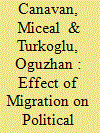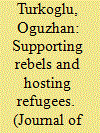| Srl | Item |
| 1 |
ID:
186330


|
|
|
|
|
| Summary/Abstract |
In recent years, a record number of people have been forcibly displaced or migrated due to conflict. Whilst established political science research suggests that displaced communities are an added risk factor for conflict due to their support for extreme co-ethnic political parties and movements, this has been challenged by recent research which shows that migrants can be a moderating force. We offer a potential reconciliation of these divergent findings by distinguishing between first- and second-generation migrants. Due to their relative lack of conflict exposure, second-generation migrants will have significantly less support for co-ethnic political parties than first-generation migrants and those who remain. We test our argument using granular survey data comparing Kurds who migrated out of the conflict zone in Turkey with those who remained. The results support our theoretical framework and have important implications for our understanding of migrant attitudes and the long-term effects of conflict exposure.
|
|
|
|
|
|
|
|
|
|
|
|
|
|
|
|
| 2 |
ID:
184196


|
|
|
|
|
| Summary/Abstract |
Why do some countries host more refugees than others? Previous research has focused on the role of geographical, political, and economic determinants, and little attention has been paid to civil conflict dynamics. In this article, I examine how a host country’s support for rebel groups may affect the number of refugees that it accommodates. Countries that support rebels host a higher number of refugees than others, as accommodating refugees can be the continuation of that support and help rebel groups in their armed struggle. By hosting people, countries may offer a sanctuary from which rebels can operate some of their insurgent activities. Rebel groups can exploit these camps for recruitment, training, and benefiting from the main services such as health care. In addition, when rebels operate in host countries, these countries may monitor, impact, or even direct the strategies of insurgent groups. Analysis of refugee flows between 1968 and 2011 suggests that countries which support rebel groups host twice as many refugees as others. Results are robust to various model specifications, two different sources for the main explanatory variable, matching analysis, and additional checks. Findings of this article highlight the importance of conflict dynamics in explaining the variation in refugee flows
|
|
|
|
|
|
|
|
|
|
|
|
|
|
|
|